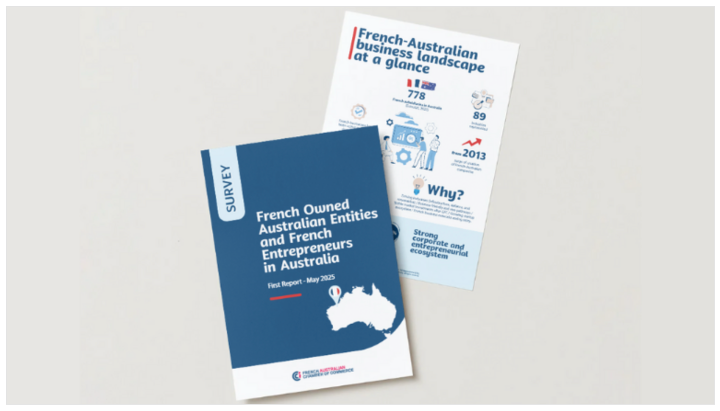The economic and business relationship between Australia and France has matured into a dynamic, mutually beneficial partnership. This connection is characterised by robust investment, entrepreneurial vigour, and a shared commitment to innovation and sustainability. Drawing on the latest findings from the French-Australian Chamber of Commerce & Industry (FACCI) and a range of external sources, let's explores below the scale, diversity, and strategic significance of the Australia–France business link in 2025.
A Robust and Expanding Investment Landscape
France is Australia's third-largest foreign investor, a status confirmed by both the Australian Federal Treasury and Eurostat (FACCI Survey Report, 2025). Major acquisitions, such as Saint Gobain's purchase of CSR, L'Oréal's acquisition of Aesop, and InVivo's investment in United Malt, sit alongside a multitude of smaller ventures, demonstrating the breadth of French engagement.
According to Eurostat, there were 778 French subsidiaries in Australia as of 2022, while the latest FACCI survey identified over 800 French-owned entities, employing more than 80,000 people. These businesses span sectors from energy and infrastructure to pharmaceuticals, IT, and business consulting.
Conversely, Australian investment in France is also on the rise. France has maintained its position as Europe's leading destination for foreign direct investment (FDI) for six consecutive years (EY Attractiveness Survey Europe 2024). This reciprocal flow of capital and expertise reflects the depth and maturity of the Australia–France economic partnership.
Diversity, Entrepreneurship, and Economic Contribution
The French business community in Australia is diverse and dynamic. The FACCI 2025 survey collected data from 342 entities, revealing a strong presence not only of large corporations but also of SMEs and entrepreneurs , many operating as sole traders or small teams. French entrepreneurs have found particular success in health, wellness, IT, and manufacturing, with some reporting annual revenues exceeding A$10 million.
The average turnover for French subsidiaries in Australia is A$259 million, with 30% surpassing the A$100 million mark. French entrepreneurs (Entrepreneurs Français de l'Etranger, or EFE) average A$2 million in turnover, with a notable proportion employing between 2 and 10 people.
French businesses are also deeply involved in local communities, supporting Australian jobs and contributing to innovation. According to the Australian Bureau of Statistics (ABS, 2024), foreign-owned companies ( including French entities) are key drivers of employment, skills transfer, and economic growth.
Strategic Hubs and Sectoral Opportunities
Sydney (NSW) and Melbourne (VIC) are the primary hubs for French business activity, offering access to large markets, advanced infrastructure, and talent pools. However, there is growing interest in Queensland (infrastructure, Olympics 2032), Western Australia (resources, mining, and energy), and South Australia (renewables, agribusiness, space).
The diversity of sectors represented is striking: from traditional industries like transportation and construction to fast-growing fields such as renewables, digital services, and advanced manufacturing. This aligns with broader trends in Australia's economy, where sustainability and innovation are national priorities (Austrade, 2024).
Programmes such as the V.I.E (Volontariat International en Entreprise) offer French companies a unique opportunity to expand internationally while benefiting from skilled young talent (Business France). These initiatives, along with the support of Team France Business and FACCI, help foster cross-cultural collaboration, skills transfer, and the development of future business leaders.
External Perspectives and Global Context
According to the OECD (OECD Economic Surveys: Australia 2023), Australia's stable regulatory environment, openness to foreign investment, and business-friendly policies make it an attractive destination for international companies, including those from France. Meanwhile, France's role as a gateway to the European market and its leadership in innovation and sustainability continue to attract Australian investors.
The European Union–Australia Trade Agreement (currently under negotiation) is expected to further strengthen economic ties, reduce barriers, and create new opportunities for bilateral trade and investment (European Commission, 2024).
The Australia–France business link is a model of strategic partnership, characterised by mutual investment, innovation, and a shared commitment to economic growth. As both nations navigate global challenges, such as digital transformation, supply chain resilience, and the transition to a low-carbon economy, their commercial ties will remain a vital asset.
Regular surveys and ongoing engagement by organisations like FACCI and Team France Business will be key to understanding emerging trends and ensuring continued support for businesses on both sides.
